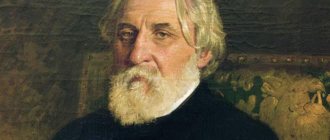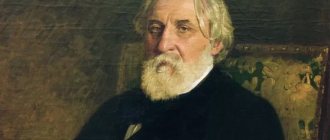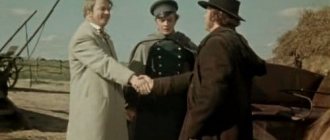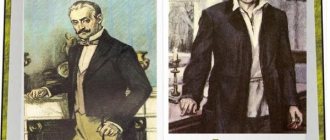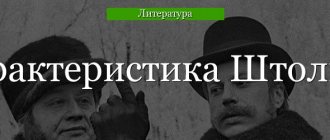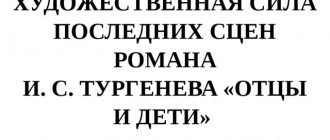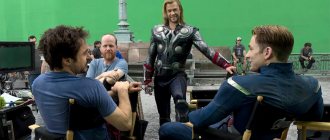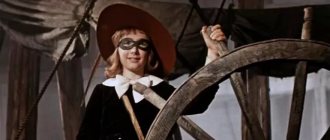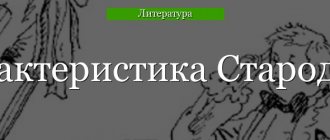Basic Description
Viktor Sitnikov is presented to readers as the son of a wealthy merchant, but the guy tries to hide his origin, being embarrassed by it. The hero proudly calls himself a liberal. Turgenev attributes to him friendship with the main characters - Bazarov and Kirsanov . It is worth noting that Sitnikov and Kukshina are pseudo-nihilists.
The author describes him as a young man of short stature. Victor has a fairly attractive appearance, but he repels people with a stupid expression on his face.
Despite his stated views, the character is more aristocratic than liberal. After all, he values comfort very much, blindly follows fashion trends, and is always stylishly and elegantly dressed. This is evidenced by the quotation: “He just came down to breakfast in a new, smart, this time not Slavophile, outfit; the day before he surprised the man assigned to him with the amount of linen he had brought..."
It can be concluded that his appearance and the opinion of society are the highest priorities for the hero. To emphasize his worth and importance, at every opportunity Victor tries to communicate his hatred of women. In the novel “Fathers and Sons,” Sitnikov’s characterization is more negative than positive.
Turgenev notes why the character is unpleasant to society. His shrill laughter causes disgust. Trying to appear smart, he only confirms public opinion, which is inclined towards his hopeless stupidity.
Another reason to despise Sitnikov is the desire to imitate his friend in everything . He lacks the self-confidence and inner core to achieve the same respect. All of Victor’s insolence is purely feigned, and there is no freedom in reasoning. Even Evgeny mocks his friend, experiencing negative emotions from communication. Main features of Vladimir:
- posturing;
- stupidity;
- complex.
Turgenev mocks his character. After many loud statements about hatred of the fair sex, Victor marries and becomes henpecked. This development of the plot indicates the guy’s insecurity and many complexes that he tried to hide behind loud statements. The author shows that the character is stupid, worthless, insignificant and does not represent a mature personality.
Sitnikov's essay in the novel Fathers and Sons (Image and Characteristics)
Sitnikov can be called a connecting character in the work, who is friends with Krisanov Jr. and Bazarov.
Being the son of a rich man, he does not become an arrogant person and does not boast about his origin and privileged position in society. You could even say that this character thinks of his relationship with a rich man as a factor that pushes others to treat him insincerely and become friends with him for the sake of their own interests and ulterior motives. He considers himself a nihilist in his modern world, and maintains a friendship with Kukshina, who supports him in his ideas and thoughts. Despite the fact that he does not think well about the role of women, and says that many of them are stupid and dependent, this hero enters into a relationship with a woman, where she takes the leading role in decision-making.
Outwardly, the character seemed like a pleasant person. He was always dressed in fashion and had a “thin and high voice.” He followed fashion trends, but was stupid and slow-witted. He repeats Bazarov's words without understanding their deeper meaning. He gets used to a comfortable life, and any discomfort in the form of open windows or poor nutrition causes him health problems, he often gets sick and is susceptible to colds. Being a shy and reserved person, he believes in the power of his own words, which he is not always able to find.
He behaves humiliatingly and basely in front of his wife, appearing as an annoying and talkative person, which was inappropriate behavior in a given situation. He behaved ingratiatingly in front of Bazarov, although he did not see any depth in him, and even tried to “prick” with a word. After all, the idea that he propagated was extremely important and deep for him. The author often shows scenes in which Sitnikov agrees to another idea, not understanding why exactly he needs it. By this, the writer evokes comical feelings in the reader, showing his superficiality and insincerity in his beliefs. However, this does not diminish its realism, since such an image was also collective for those people who blindly believe in an idea, although they do not understand its basic essence. Although this character was a friend for Bazarov, due to the fact that the level of intellectual development of the second was higher, their relationship was unequal. Bazarov himself spoke of him as a simple person who must comprehend and know more things in this difficult world.
Meaning of the image
The characterization of Sitnikov and Kukshina shows the reader two satirical characters who look comical throughout the entire storyline. It is not difficult for Bazarov to understand that all of Victor’s statements are feigned, and this disgusts him. Sitnikov made Evgeniy his idol and tries to imitate him in everything, including his manner of communication. It was this character that brought the two main characters together with Evdokia.
By presenting Kukushkina as an emancipated person, he expected to receive respect from men. But in the end they were disappointed, realizing that this woman was arrogant and vulgar, but did not represent anything else, just like Sitnikov.
She manages the estate herself, smokes and drinks a lot, and sometimes tries to play the piano by drumming on the keys.
Turgenev described her as a very unattractive, extravagant lady with a naive, childish character. Her interest in nihilism lies in the search for the meaning of life. Kukshina is confident that with her progressive views she protects women around the world. The author decided to include them in the content as ideological antipodes of Evgeniy Bazarov.
Characteristic 2
According to the plot of the work, Viktor Sitnikov was the best friend of Evgeny Bazarov and Arkady Kirsanov. He was the son of a famous large merchant, but for some reason he hid his origins from those around him. Maybe because his parents were more conservative and gifted people. Sitnikov differed from his friends in his liberal views. Compared to the others, he seemed like a stupid, uneducated person who could not clearly and meaningfully express his thoughts, much less defend them. The hero's stupidity and strange thinking caused laughter among those around him. Many made fun of Sitnikov.
Viktor Sitnikov is a nihilist, and that’s how he presents himself to everyone around him. But in fact, this is only a fictitious image, which is not always clear to him. It is worth noting that Sitnikov very rarely spoke about women, and if he did, it was only unflattering things. In his conversations one could feel some kind of hatred for the weaker sex. What this is connected with was not indicated in the novel.
However, according to the plot of the novel, Viktor Sitnikov eventually marries, and soon even becomes henpecked by his wife. Because of this, he has to hear ridicule about himself. Sitnikov is not upset. After all, all his life all his friends openly considered him a stupid person, including his own wife. She called him a “stupid writer.” But Sitnikov was not offended by her.
Sitnikov himself is a weak-willed person. He is easily influenced by other people's opinions and supports delusional ideas without even delving into their essence. That is why people often used Sitnikov for their own purposes. Victor himself is a talkative person, he loves life and everything connected with it. Loves comfort and consistency.
Despite his image and character, Sitnikov is remembered by the reader, and even seems interesting. His actions seem funny and unusual. It is clear that the image of Sitnikov was used in the novel for a reason: he is a kind of antithesis of Bazarov, and Bazarov is devoted to his ideas. Against this background, the author provides a clear comparison of the two moral views.
Character Role
The analysis of these personalities is extremely important for understanding the image of the main character. Although Victor assures everyone around him that he is continuing the work of his teacher, he does not understand anything about nihilism . This is evidenced not only by his behavior, but also by his manner of dressing, behaving, and attitude towards the world.
The author ironically calls the character Bazarov's student, follower, emphasizing the absurdity of what is happening. After all, his every action contradicts these concepts. And Bazarov is convinced that even the nobility, whom he opposes, is smarter than Victor.
Using this image, Turgenev reveals the essence of the theory of nihilism. After all, even the main character says something completely different from what he feels.
Each image in the novel plays its own role and is connected to each other not only by contradictions, but also by similarities. As a result, the author makes it clear to readers that Bazarov’s theory is not valid in the real world . Sitnikov’s portrait will help you better understand the essence of the work and draw up a comparison table with other characters.
Popular writings
The painting, painted by one of the great artists of Russia, amazes with its naturalness, even slightly frightening reality. Yes, and the very name of this work of art, “In the Wild North,” gives away the whole meaning inherent in it.
Very often you can hear that the family is the unit of society. How can we understand this expression? First of all, the family is a unique thing from a sociological point of view. At the same time, a family is also a small group
It’s interesting how the elements of craftsmanship and the subtleties of art have thoroughly entered our everyday life, while once upon a time the craftsmen who created clay products with their own hands
Source
Sample 4
Unlike the convinced opponent of the existing system, the ideologically integral Bazarov, Viktor Sitnikov does not pose any danger to the regime and the old order. He is simply a victim of a new fashion coupled with his stupidity. Sitnikov is the son of a wealthy merchant, who, however, is ashamed of his origin, as not corresponding to the new era and its ideas. At the same time, he does not refuse to take advantage of his origin. In particular, Turgenev emphasizes the character’s love for comfort and fashionable, expensive clothes.
Sitnikov constantly repeats the words he heard from Bazarov and similar ideologists of nihilism about the denial of the old orders and ideas. However, the author shows that the merchant's son, playing progressive, liberal and Slavophile, does not understand his own beliefs very well. The writer constantly demonstrates the stupidity and limitations of this hero of his, both in the description of his actions and in the assessment of him by those around him.
Among other qualities of this character, the author highlights his talkativeness. Pronouncing phrases that are not fully understood helps him feel his importance and cover up his inner emptiness. The author also gives him an unpleasant shrill voice and a tendency to laugh a lot, which should emphasize the frivolous nature of this character.
Sitnikov is a fairly common type. In the political environment and in circles where it is fashionable to demonstrate free-thinking, there have always been and will be many of these. Sitnikov and others like him can only create a background, so they are useful to real fighters against the existing order. The Bazarovs, realizing their insignificance, simply use such people, receiving money and services from them, while not particularly hiding their contempt for such adepts from the teachings.
The image and characteristics of Sitnikov in the novel Fathers and Sons of Turgenev
In Turgenev's novel Fathers and Sons, Viktor Sitnikov is a minor character. Victor was born into the family of a wealthy merchant, but was always ashamed of his origins. He maintains friendship with Evgeny Bazarov and Arkady Kirsanov. Sitnikov considers himself a liberal and, like landowner Evdokia Kukshina, a nihilist.
Sitnikov is a young man of short stature, despite his pleasant appearance, always walks with a stupid expression on his face. He loves comfort, dressing fashionably and elegantly, despises women and talks about it at every opportunity. What is unpleasant and repulsive in the image of Victor is his laughter, always loud and shrill, causing only disgust. He wants to seem like a smart and well-read person, but most of his friends consider Victor stupid.
The young man considers himself a follower and student of Yevgeny Bazarov. His sincere desire to imitate his friend and be an ardent nihilist causes nothing but contempt from society. In order to at least somehow resemble Bazarov, Victor lacks inner confidence and core. His feigned desire to be daring, free in his reasoning about nihilism causes Bazarov only mockery and unpleasant sensations.
Despite the fact that Victor tries to be a supporter of nihilism, to have a negative and disapproving attitude towards the female sex, he ultimately marries and becomes completely subservient to his wife. Under the mask of nihilism, Sitnikov hides his own insecurity and many complexes. Victor is nothing of himself as a person; he is worthless, stupid and insignificant.
Viktor Sitnikov, like Evdokia Kukshina, is a satirical character; throughout the entire story he looks comical and funny. Bazarov understands that everything Sitnikov says is feigned and despises his friend. Victor, on the contrary, considers Bazarov his “idol” and tries to be like his teacher with all his behavior and manner of communication. It was Sitnikov who introduced Bazarov and Kirsanov to Evdokia Kukshina, calling the woman an “emancipated person.” In fact, after getting to know each other more closely, the young people saw nothing but arrogance and vulgarity in the woman.
Viktor Sitnikov is a weak-willed, stupid and complex person; after communicating with him, he evokes nothing but negative emotions.
Essay on the theme of Sitnikov
Sitnikov is a friend of Bazarov and Kirsanov Jr. He is the son of a rich merchant, he does not boast of his privileged position, does not boast of wealth. He even worries to some extent about his origin, because he believes that many are prejudiced against him because of him.
He considers himself a nihilist; he is friends with Kukshina, who holds the same views. Despite the fact that this character very often talks about women's stupidity, lack of independence and limitations, he connects his life with a woman with whom he becomes henpecked.
We can read the following about the character’s appearance: he had quite pleasant facial features, his eyes did not express the active work of thought, his voice was characteristically high, even somewhat shrill. He knows about all fashion trends, he is dressed well. He was a stupid, unintelligent man. As a rule, he simply repeats Bazarov's speeches. He likes to criticize the actions of certain people; he does not think about the essence of things, human actions in principle.
Sitnikov loves to live in comfortable and convenient conditions; he very often has health problems, catches colds, and gets sick.
Despite some absolute confidence in his own statements, he was a shy and timid person. He could not really calmly pronounce the words that were required of him in a given situation. He humiliates himself in front of his wife for quite a long time.
